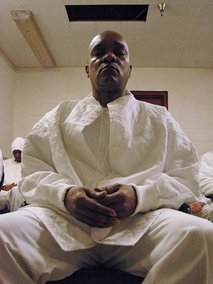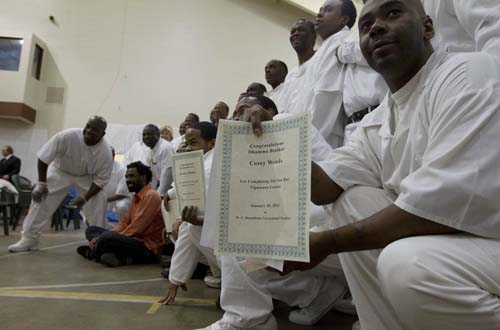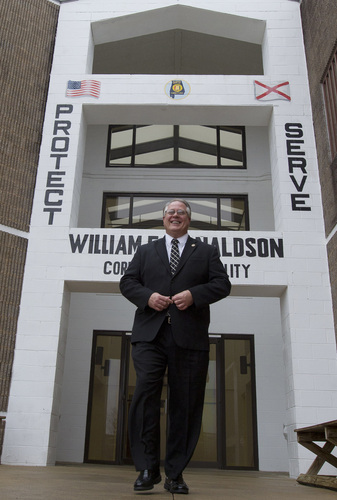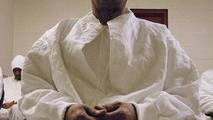Meditation class helps lower violence at Alabama prison
Source: http
 Deep inside an overcrowded prison with a reputation for mayhem, convicted killers, robbers and rapists gather in a small room. Eyes closed, they sit silently with their thoughts and consciences.
Deep inside an overcrowded prison with a reputation for mayhem, convicted killers, robbers and rapists gather in a small room. Eyes closed, they sit silently with their thoughts and consciences.Their everyday life is just outside in the hall — a cacophony of clanging steel doors, yelling and feet shuffling along cold concrete floors. The noise never really ends; peace is at a premium in Alabama’s toughest lockup.
Despite a history of violence at the William E. Donaldson Correctional Facility, which is named for a slain corrections officer, the prison outside Birmingham has become the model for a meditation program that officials say helps inmates learn the self control and social skills they never got in the outside world.
Warden Gary Hetzel doesn’t fully understand how the program called Vipassana (which is pronounced vuh-’POSH-uh-nuh) can transform violent inmates into calm men using contemplative Buddhist practices.
But Hetzel knows one thing.
"It works. We see a difference in the men and in the prison. It’s calmer," he said of the course that about 10 percent of the prison’s inmates have completed.
The word Vipassana means "to see things as they really are," which is also the goal of the intense 10-day program using the meditative technique that dates back 2,500 years.
Vipassana courses are held four times a year in a prison gymnasium, where as many as 40 inmates meditate 10 hours a day. Most sit on cushions on the floor, while a few use chairs.
The courses begin with three days of breathing exercises — the prisoners learn to focus on bodily sensations so intently they feel the exhalations on their upper lip. Students are required to not speak to each other.
Outside volunteers guide their way, along with recordings of chanting and instructions.
On Day 4, students are told to begin letting their deepest thoughts percolate up through their consciousness so they can sense the effects on the body, like tension or anger. The ultimate goal is to learn not to react to those sensations.
Students are forced to grapple with their innermost selves. Some men are brought to tears; a few have thrown up. It’s not unusual for half of the students or more to quit or be sent back to the prison population for disobeying the rules.
Those who finish come out changed, prison officials say.

Convicted murderer Grady Bankhead said the hours of meditation forced him to accept responsibility for his crime and helped him find inner peace. Bankhead, who’s serving life without parole, radiates calm.
"I’ve been here for 25 years and this statement is going to sound crazy, but I consider myself the luckiest man in the world," Bankhead, 60, said last month after the latest course at Donaldson.
For Ronald McKeithen, Vipassana became a tool for controlling his actions.
"I had a lot of anger issues, and this has given me a way to deal with it," said McKeithen, 48, serving life without parole for robbery. Eyes shut, his face is relaxed during a weekly meditation session for prisoners who finish the program.
Vipassana courses have been taught in Indian prisons for decades and began in 2002 at Donaldson. The program was temporarily shut down over concerns among some Christians that Vipassana was some sort of evangelical Buddhism — it’s not, teachers and prisoners insist — but it restarted in 2006.
"It’s medicine for the mind," said Timothy Lewis, 45, serving life without parole for robbery and assault.
About 380 state inmates have completed a Vipassana course, said Dr. Ronald Cavanaugh, who brought the program to Donaldson while working there and is now treatment director for the Alabama Department of Corrections. It took him three years to convince administrators to allow the program and to find the space for it.
A Department of Corrections study of about 100 inmates who completed the program and were still in custody in late 2007 found they had 20 percent fewer disciplinary actions after the course, Cavanaugh said.
"The goal of Vipassana is to change one’s relationship to thoughts instead of changing the content of the thoughts," said Cavanaugh. "You don’t need to act or react to thoughts. You can just observe them."
Vipassana courses have been taught at a few other lockups in California, Massachusetts and Washington, but ended for reasons including space limitations, security concerns and funding. Donaldson is currently the only U.S. prison with the courses, but advocates are trying to get others interested, said Harry Snyder of the Vipassana Prison Trust. The trust pays for volunteers to travel to the prison and conduct courses.
John Gannon, executive director of the International Association for Correctional and Forensic Psychology, said he applauds Alabama’s efforts.
"Anything that helps to reduce impulsivity is likely to reduce recidivism ... and that’s what the process is about as I understand it," said Gannon, of Pismo Beach, Calif.
Baptists far outnumber Buddhists in Alabama, and state corrections officials deserve credit for their willingness to try the program, said Jenny Phillips, a Massachusetts psychotherapist who introduced Cavanaugh to Vipassana meditation.
Phillips wrote a book and produced a documentary movie about the Donaldson program called "The Dhamma Brothers," which incorporates the Indian word that refers to the concept in Vipassana of gaining happiness through doing good for others. It’s an older, alternate spelling of the word "dharma," which is used more often in popular culture.
"You can feel the energy when another Dhamma brother passes by you," said Bankhead, an inmate leader of the program. "You can relax. It’s one person calming five or six."
While the warden said Vipassana helps officers and administrators keep a lid on Donaldson, the lockup is still considered the state’s roughest. It’s the last stop for inmates with behavior problems, and more than one-third of its approximately 1,500 prisoners are either serving sentences of life without parole or are on death row.
A judge is currently considering a prisoner lawsuit that claims Donaldson is so crowded and violent it violates inmates’ constitutional rights. State officials don’t deny that Donaldson has problems, but they dispute that the lockup is unconstitutionally harsh.
An organization for corrections officers has taken the unusual step of siding with the inmates by agreeing with some of their claims about Donaldson, but no trial date is set.

In this Jan. 18, 2011 photo, Gary Hetzel, warden of the William E. Donaldson prison, departs the maximum security facility in Bessemer, Ala. The prison holds Vipassana meditation courses four times a year in a prison gymnasium, where as many as 40 inmate volunteers meditate 10 hours a day. Hetzel doesn’t fully understand how the program can transform the most violent inmates into thoughtful, calm men using contemplative Buddhist practices. But Hetzel knows one thing: "It works."
Article from: greenfieldreporter.com
Photos: AP Photos/ Dave Martin
The Dhamma Brothers (trailer)
Video from: YouTube.com






















